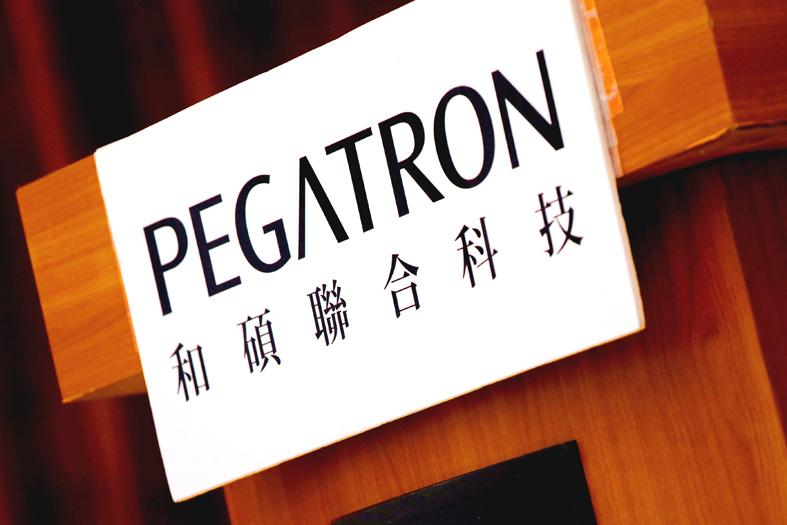IPhone assembler Pegatron Corp (和碩) has suspended production at its Chinese plants in Shanghai and Kunshan, China, as the country’s policies to control the worst COVID-19 outbreak in two years disrupt global supply chains.
Resumption of output at the sites would depend on notifications from the Chinese government, Pegatron said in an exchange filing yesterday.
The company is continuing to assess the suspension’s impact on its finances.

Photo: Tyrone Siu, Reuters
The company makes iPhones in Shanghai and nearby Kunshan, both under lockdowns as China pursues its “zero COVID-19” strategy.
Pegatron had been able to keep production humming thus far as local governments allowed some manufacturers to maintain their operations with a closed-loop system that reduces the chances of workers getting infected.
Pegatron splits iPhone assembly orders in China with bigger Taiwanese rival Hon Hai Precision Industry Co (鴻海精密), known as Foxconn Technology Group (富士康科技集團) outside of Taiwan, and Chinese peer Luxshare Precision Industry Co (立訊精密).
Foxconn last month suspended some iPhone assembly work in Shenzhen for a few days because of COVID-19-related restrictions.
Shanghai on Monday said that it was partially easing a citywide lockdown, but majority of its residents are still subject to tight movement restrictions and local Chinese Communist Party chief Li Qiang (李強) vowed to continue measures to control the outbreak.
The weeks-long lockdown has triggered a food shortage and threatened to throw already fragile supply chains into further turmoil.
Kunshan’s local government said it would stick with existing COVID-19 prevention policies, despite a decline in the number of cases, asking residents to “make less fuss” and fully comply with the measures.
Local officials have reported three positive COVID-19 cases in Pegatron’s dormitory in Kunshan in the past four days.
Widespread Chinese lockdowns are exacting an unknown toll on the world’s No. 2 economy, where most electronics from iPhones to laptops and PCs are made.
While many of the most critical factories in cities such as Shanghai have managed to stay in operation, worsening logistics jams are constricting shipments of components, draining inventories to the point where some manufacturers including Pegatron are down to just a few weeks’ stocks, consultancy TrendForce Corp (集邦科技) estimated.
In total, 161 Taiwanese companies have suspended production amid COVID-19 lockdowns in Shanghai and Kunshan, the Financial Supervisory Commission (FSC) said on Monday.
The companies have activated contingency plans, such as adjusting production schedules or processes and outsourcing production to other factories, Securities and Futures Bureau Director-General Sam Chang (張振山) told a meeting of the legislature's Finance Committee in Taipei.
None of the companies have reported being significantly affected financially by the closures, he said.
Chang was answering a lawmaker’s question about the effects of the lockdowns, which have been in place in Shanghai since late last month and in Kunshan since early this month.
Chinese Nationalist Party (KMT) Legislator Lee Guei-min (李貴敏) asked FSC Chairman Thomas Huang (黃天牧) if there was any chance that companies were not reporting the full extent of the lockdowns’ effects on their operations, which could pose a risk to investors.
Huang said that each company has to judge for itself whether its situation meets the materiality threshold for issuing a statement through the Taiwan Stock Exchange, adding that the exchange would pursue legal action in the event of false reporting.
Additional reporting by CNA

Sweeping policy changes under US Secretary of Health and Human Services Robert F. Kennedy Jr are having a chilling effect on vaccine makers as anti-vaccine rhetoric has turned into concrete changes in inoculation schedules and recommendations, investors and executives said. The administration of US President Donald Trump has in the past year upended vaccine recommendations, with the country last month ending its longstanding guidance that all children receive inoculations against flu, hepatitis A and other diseases. The unprecedented changes have led to diminished vaccine usage, hurt the investment case for some biotechs, and created a drag that would likely dent revenues and

Global semiconductor stocks advanced yesterday, as comments by Nvidia Corp chief executive officer Jensen Huang (黃仁勳) at Davos, Switzerland, helped reinforce investor enthusiasm for artificial intelligence (AI). Samsung Electronics Co gained as much as 5 percent to an all-time high, helping drive South Korea’s benchmark KOSPI above 5,000 for the first time. That came after the Philadelphia Semiconductor Index rose more than 3 percent to a fresh record on Wednesday, with a boost from Nvidia. The gains came amid broad risk-on trade after US President Donald Trump withdrew his threat of tariffs on some European nations over backing for Greenland. Huang further

Macronix International Co (旺宏), the world’s biggest NOR flash memory supplier, yesterday said it would spend NT$22 billion (US$699.1 million) on capacity expansion this year to increase its production of mid-to-low-density memory chips as the world’s major memorychip suppliers are phasing out the market. The company said its planned capital expenditures are about 11 times higher than the NT$1.8 billion it spent on new facilities and equipment last year. A majority of this year’s outlay would be allocated to step up capacity of multi-level cell (MLC) NAND flash memory chips, which are used in embedded multimedia cards (eMMC), a managed

CULPRITS: Factors that affected the slip included falling global crude oil prices, wait-and-see consumer attitudes due to US tariffs and a different Lunar New Year holiday schedule Taiwan’s retail sales ended a nine-year growth streak last year, slipping 0.2 percent from a year earlier as uncertainty over US tariff policies affected demand for durable goods, data released on Friday by the Ministry of Economic Affairs showed. Last year’s retail sales totaled NT$4.84 trillion (US$153.27 billion), down about NT$9.5 billion, or 0.2 percent, from 2024. Despite the decline, the figure was still the second-highest annual sales total on record. Ministry statistics department deputy head Chen Yu-fang (陳玉芳) said sales of cars, motorcycles and related products, which accounted for 17.4 percent of total retail rales last year, fell NT$68.1 billion, or